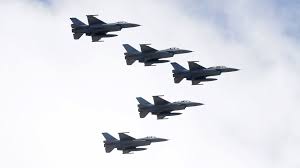Lanhee J. Chen
According to the Washington Post, leaked Pentagon documents on the messaging platform Discord recently revealed that US military officials have doubts about Taiwan’s ability to repel an air attack from the Chinese military and, moreover, that the US itself may be limited in its ability to detect a coming attack on Taiwan. These reports add to concerns in the region, particularly as China launched a series of military drills in the air and waters near Taiwan, in the wake of House Speaker Kevin McCarthy’s recent meeting in California with Taiwan President Tsai Ing-Wen.
Taiwan has taken on increased attention in the US in recent years, particularly given heightened tensions in the relationship between Washington and Beijing. Strong bipartisan support for Taiwan across the last two presidential administrations, as well as on Capitol Hill, has only added to the sense that America is taking more of an interest in the pivotal role that Taiwan plays in the Indo-Pacific region.
So, too, are there increasing efforts in Taiwan to understand the nature of America’s commitment to it and the extent to which military and other support might extend – particularly if China chooses to become more belligerent toward Taiwan in the future. I visited Taiwan in late March as part of a US delegation that met with senior Taiwanese leaders in government and civil society, including Tsai. The visit revealed that while most residents of Taiwan are living their lives as usual, the island’s leaders are deeply focused on preparing for an attack from the People’s Republic of China and understand well the role that electoral politics—both in Taiwan and the US—will play in what comes next.
This focus is not only warranted, but wise, given the arguably increasing threat Taiwan faces from China. Taiwan is only about 100 miles east of mainland China, so it’s probably no surprise that the specter of a Chinese military attack is a front-and-center concern for the leadership in Taipei. The incumbent administration is particularly focused on this because of complaints at high levels of both the Taiwanese and US governments about the lack of preparation and poor morale in the Taiwanese military.
During our visit, senior officials emphasized changes to enhance preparedness and improve military training, and have moved to increase mandatory military conscription terms for male citizens from four months to one year beginning in 2024. We also heard several laments about the slow pace of military equipment deliveries (such as of Stinger anti-aircraft missiles, F-16 aircraft and anti-ship missiles) from the US – a perspective that Taiwanese officials have expressed to US leaders for some time. Several members of Congress have asserted their intent to press the Biden administration on accelerating deliveries, but manufacturing constraints, supply chain disruptions and, to a lesser degree, demand created by weapons shipments to support Ukraine in its battle against Russia have contributed to the slowdown.
Presidential politics are never far away from any conversation about the future of the self-governing island. There was considerable curiosity from Taiwanese officials about how the 2024 US presidential election will develop—something to be expected given the reality that whoever occupies the White House plays a significant role in dictating the tone and tenor of the bilateral relationship between Washington and Taipei. Former President Donald Trump is lauded in Taiwan for strengthening ties between the US and Taiwan, initiating high-level diplomatic visits between senior US administration officials and their Taiwanese counterparts and going so far as to take Tsai’s congratulatory phone call after his 2016 election, in what was then seen as a breach of diplomatic protocol.
Nonetheless, several senior Taiwanese officials expressed disbelief when I told them that Trump might actually be the Republican nominee for president again, particularly given his recent legal troubles. President Joe Biden is also viewed favorably in Taiwan, particularly because of promises that the US would defend Taiwan if it was attacked by China. His comments seemed to indicate a change to existing US policy toward Taiwan on this question, which has been encapsulated by the term “strategic ambiguity”—that is, a deliberate vagueness regarding questions of if, and to what degree, the US would intervene if China were to engage in military aggression against Taiwan. But senior administration officials have repeatedly stressed that, notwithstanding Biden’s statements, US policy toward Taiwan has not changed.
While Taiwanese officials were much more circumspect in their evaluations of Biden, we met a number of Taiwanese citizens outside government who expressed concerns about his age and showed bemusement about the seeming lack of competition for the Democratic Party’s presidential nomination in 2024.
Taiwan’s next presidential election will take place in January 2024 and already both major political parties (the incumbent Democratic Progressive Party, or DPP, and the Nationalist Party, or Kuomingtang) are positioning themselves for the upcoming campaign. While there are differences between the parties on economic and social issues, the primary cleavage between them is how Taiwan will approach China and the broader geopolitical issues at play in the region.
The Kuomingtang, which has promised some rapprochement with Beijing, is effectively arguing that a vote for the DPP is a vote for conflict (and perhaps even war) with China. The DPP, on the other hand, claims that only its leaders will continue to foster closeness between the US, other regional allies and Taiwan. The debate will only intensify as both parties select their nominees and the electoral campaign kicks into high gear in the next few months.
Taiwanese officials must deal with the reality that with each passing day, an attack from China may be drawing near. Their focus on military readiness, but also politics both at home and in the US, is reflective of this concern. But while Taiwan’s leaders have their eyes turned toward a pending threat, what was clear during our visit was that the threat from China wasn’t front of mind for most ordinary Taiwanese citizens. Instead, they were focused on leading their lives, all while trusting that their elected representatives are doing all they can to protect them against what may be to come.
CNN







